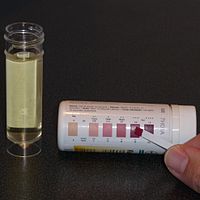
Photo from wikipedia
Introduction The Very Low-Calorie Ketogenic Diet (VLCKD) has emerged as a safe and effective intervention for the management of metabolic disease. Studies examining weight loss predictors are scarce and none… Click to show full abstract
Introduction The Very Low-Calorie Ketogenic Diet (VLCKD) has emerged as a safe and effective intervention for the management of metabolic disease. Studies examining weight loss predictors are scarce and none has investigated such factors upon VLCKD treatment. Among the molecules involved in energy homeostasis and, more specifically, in metabolic changes induced by ketogenic diets, Fibroblast Growth Factor 21 (FGF21) is a hepatokine with physiology that is still unclear. Methods We evaluated the impact of a VLCKD on weight loss and metabolic parameters and assessed weight loss predictors, including FGF21. VLCKD is a severely restricted diet (<800 Kcal/die), characterized by a very low carbohydrate intake (<50 g/day), 1.2–1.5 g protein/kg of ideal body weight and 15–30 g of fat/day. We treated 34 patients with obesity with a VLCKD for 45 days. Anthropometric parameters, body composition, and blood and urine chemistry were measured before and after treatment. Results We found a significant improvement in body weight and composition and most metabolic parameters. Circulating FGF21 decreased significantly after the VLCKD [194.0 (137.6–284.6) to 167.8 (90.9–281.5) p < 0.001] and greater weight loss was predicted by lower baseline FGF21 (Beta = −0.410; p = 0.012), male sex (Beta = 0.472; p = 0.011), and central obesity (Beta = 0.481; p = 0.005). Discussion VLCKD is a safe and effective treatment for obesity and obesity related metabolic derangements. Men with central obesity and lower circulating FGF21 may benefit more than others in terms of weight loss obtained following this diet. Further studies investigating whether this is specific to this diet or to any caloric restriction are warranted.
Journal Title: Frontiers in Nutrition
Year Published: 2023
Link to full text (if available)
Share on Social Media: Sign Up to like & get
recommendations!